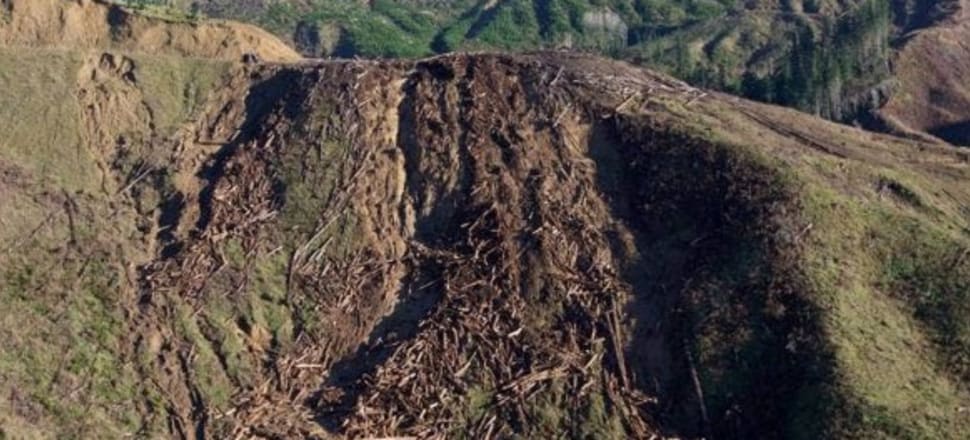
Comment: New Zealand's forestry standards are weak, but the industry is already bound by international standards it is breaching routinely in Tairāwhiti, writes Dame Anne Salmond
In the wake of the devastation caused by forestry slash in Tairāwhiti during Cyclone Gabrielle, it is obvious to almost everyone that the Government's National Environmental Standards for Plantation Forestry (NES - PF) are too permissive, and have to be rewritten.
While the forestry industry disagrees, this is disingenuous, because the major forestry companies have already signed up to a far more stringent set of standards, set by the Forestry Stewardship Council (FSC) in Bonn.
According to the FSC (NZ) Standard, for instance, “Forest operations [should be] structured and managed so as to be sufficiently profitable, without generating financial profit at the expense of the forest resource, the ecosystem, or affected communities.” (FSC Standard NZ, 2023:5)
Wouldn’t that be brilliant?
For regions like Tairāwhiti, “hilly and mountainous landscapes can make forestry challenging as erosion poses a real threat to NZ forest management, both in harvesting and planting. Special consideration must be taken to minimize and mitigate the risk of landslides that could lead to the harm of forest workers, waterways, communities, flora, and fauna.” (FSC Standard NZ, 2023:12).
Given the widespread devastation caused by landslides and forestry waste in Tairāwhiti in the wake of Cyclone Gabrielle, its clear that this requirement has been radically breached.
The standard also requires FSC-certified forestry companies to observe national and local laws and regulations (FSC Standard NZ, 2023:16).
Nevertheless, a number of the major forestry companies in Tairāwhiti have been successfully prosecuted for breaches of local laws and regulations, and yet have kept their certification.
FSC-registered companies also promise to “identify, prevent, and resolve disputes over issues of statutory or customary law, which can be settled out of court in a timely manner, through engagement with affected stakeholders.” (FSC Standard NZ, 2023:17).
However In a recent conviction of Ernslaw NZ, an FSC-certified company owned in Malaysia and the second largest private landowner in New Zealand, the judge made scathing comments about the ‘obdurate position’ it had adopted in refusing to accept responsibility for devastation caused by forestry slash in Tolaga Bay. He added this was ‘a serious case of environmental offending’ and its culpability was ‘very high.’ Still, this company retains its FSC certification.
The FSC(NZ) standard also requires forestry companies to “protect or restore natural water courses, and avoid negative impacts on water quality and quantity and mitigate and remedy those that occur.” (FSC Standard NZ:39). Across Tairāwhiti, where streams and rivers have been ravaged by slash and sediment, no restoration projects have been proposed by the forestry companies.
Many submitters to the government Inquiry into the social, ecological and economic devastation caused by forestry slash and sediment in Tairāwhiti have called for a moratorium on planting and harvesting on highly erodible land until ways of minimising this harm have been agreed.
This is consistent with the FSC(NZ) standard which states that “Operations [shall] cease in areas while disputes exist: 1. Of substantial magnitude; or 2. Of substantial duration; or 3. Involving a significant number of interests” (FSC Standard NZ, 2023:18).
In the wake of Cyclone Gabrielle, harvesting has resumed despite the sheer magnitude, scale and long-lasting impacts of the damage caused by forestry waste in Tairāwhiti to families and communities, and almost every other business in the region.
Overall, the FSC(NZ) standard says an FSC-certified company will “identify, avoid and mitigate significant negative social, environmental, and economic impacts of its management activities on affected communities.”
In Tairāwhiti at present, mitigation is cursory, and the identification and avoidance of negative impacts on local communities clearly hasn’t happened.
The FSC(NZ) standard also requires forestry companies to include in their management plans “costs related to preventing, mitigating, or compensating for negative social and environmental impacts of management activities.”
FSC certification gives a forestry company a major commercial advantage by allowing it to “market their products and services as the result of environmentally appropriate, socially beneficial, and economically viable forest management.”
In the case of some FSC-certified forestry companies in Tairāwhiti, this is greenwashing on a grand scale.
In summary, if the Government rewrites the National Environmental Standards (Plantation Forestry) in line with the FSC(NZ) Standard, the major forestry companies in New Zealand can hardly complain.
After all, they are simply being asked to honour promises they have already made to their customers, to communities in New Zealand, and to the Forestry Stewardship Council in Bonn.
As for the Ministerial Inquiry into Forestry Slash and Land Use, it should follow the FSC(NZ) Standard in framing its recommendations to government.
Under this standard, the forestry companies should stop planting and clearfelling in highly erodible hill country in New Zealand (FSC Standard NZ, 2023:12).
In Tairāwhiti, they should pay compensation for the crops, vineyards, fences, paddocks, farm buildings, roads, bridges, stopbanks, houses, lives and livelihoods wrecked by forestry slash (FSC Standard NZ, 2023:33).
They should stop harvesting until the slash has been cleared, waterways restored and disputes with local landowners resolved (FSC Standard NZ, 2023:18).
And in future, forestry companies should be required to “identify, avoid and mitigate significant negative social, environmental, and economic impacts of [their] management activities on affected communities” (FSC Standard NZ, 2023:30).
Simple as that.







